- Home
- Peter S. Beagle
A Dance for Emilia Page 3
A Dance for Emilia Read online
Page 3
Marianne—still all flying red hair and opening night, down to her gilded toenails—informed me that Sam hadn't left a will, which surprised me. He was always far neater than I, not merely about the apartment or his dress, but about his life in general. Letters were answered as they came in; his filing cabinet held actual alphabetized files; he always knew where his book and magazine contracts were; and he had a regular doctor and a real lawyer as well, who doubled as his literary agent. But there was no will in the filing cabinet, no will to be found anywhere.
"We'd been talking about it," the lawyer said defensively. "He was going to come in. Anyway, I've spoken to the parents, and they want you to act as executor."
I called Mike and Sarah from the lawyer's office. They were frail insect voices, clouded by age and distance and despair, static from deep space. Yes, they did wish me to be Sam's executor—yes, they would be grateful if I could clean out the apartment, sort his business affairs, and get the police to release his body, as soon as the coroner's report came in. Sarah asked after my mother and father.
The report said things like myocardial infarction and ventricular fibrillation; death almost certainly instant. We buried Sam in an Astroturf cemetery in Queens, within earshot of the Van Wyck Expressway. Mike and Sarah had managed to handle the funeral arrangements from Fort Lauderdale, which proved they remembered me well enough to know that I'd likely have wound up stashing their son in a Dumpster or a recycling tin. A limousine from the mortuary brought them to the funeral: they stepped out blinking against the sharp autumn sunlight, looking pale and small, for all the years in Florida. I went over to embrace them, and we had a moment to murmur incoherently together before two men in dark suits took them away to the grave site. I followed with Marianne, because there was no one else I knew.
It didn't surprise me. I'd learned long since that Sam preferred to keep the several worlds in which he moved—music, theater, journalism, ballet classes—utterly separate from each other. I'd known the names of some of his friends and colleagues for years, without ever meeting one. By the same token, I knew myself to be the entire mysterious, vaguely glamorous West Coast world into which he vanished once in a great while. Until now, it had all suited and amused me.
An old Friday-night poker acquaintance drifted up on my left as I stood at the coffin behind Mike and Sarah and the dark suits. We shook hands, and he whispered, "Yes, I know, I got fat," while I was still trying to remember his name. I never did.
The rabbi looked like a basketball player, and he hadn't known Sam. It was a generic eulogy, no worse for the most part than many I've sat through, until he fixed his shiny blue gaze on Mike and Sarah and started in about the tragedy of living to bury an only son. I turned away, eyeing the exits. Damn, Sam, if you hadn't stuck us with these damn ringside seats, we could slide out of here right now, and be on the second beer before anyone noticed. But he had to stay, so I did too.
That was when I saw the small dark woman standing alone. Not that she was physically isolated—you couldn't be in that crowd, and still see grave and rabbi—but her solitude, her apartness, was as plain as if she had been a homeless lunatic, trundling a Safeway cart, all by herself with God. She was looking at the rabbi, but not seeing or hearing him. I patted Marianne's arm and eased away. It's okay, Sam. I see her.
Close to, she was thin, and looked paler because of her dark hair and eyes. She looked older, too—I'm bad at ages, and I'd been braced for a schoolgirl in a leather miniskirt, but this woman had to be twenty-eight or twenty-nine, surely. I said quietly, "You're Emilia. He never told me your last name."
When she turned to face me, I saw that her nose must have been broken once, and not set quite right. The effect was oddly attractive, the bumpy bridge lending strength and age to a face whose adult bone structure had not yet finished its work. Only her eyes were a full-grown woman's eyes, an old woman's eyes just now. An intelligent, ordinary face that grief had turned shockingly beautiful.
"It's Rossi," she said. "Emily Rossi." Her voice was low, with the muffled evenness that comes with fighting not to cry. "Please, is there any chance at all that you could be Jacob Holtz?"
"Sam called me Jake," I answered. "We can go now."
As we started to move away, she paused and looked back at the rabbi, who was still telling Mike and Sarah what they felt about their loss. We could smell the raw earth from where we stood. She said softly, "I imagined going up to them, talking with them, letting them know that I loved him, too, that he didn't die alone. But he did, he did, and I'd never have the courage anyway." The back of her neck seemed as vulnerable as a small child's. She said, "He always called me Emilia."
Being an executor means, finally, cleaning the place up. In a legal sense, there wasn't that much for me to do, once the police had finally unsealed the apartment and released Sam's body for burial. Bills paid off, bank account closed out, credit cards canceled, Mike and Sarah's names replacing his on God knows how many computers—how little it takes, after all, to delete us from the Great Database. A heavenly keystroke, no more.
But somebody has to clean up, and the landlord was anxious to have Sam's apartment empty, ready to be rented again for quadruple what Sam had been paying. I spent all day every day for more than three weeks at the apartment, sorting my friend's possessions into ever more meaningless heaps, then starting over with a new system for determining what went or stayed. With electricity and telephone long since cut off, the place remained cold even when the sun was shining in the windows, and tumultuous Columbus Avenue outside looked so remote, so unattainable, that I felt like an astronaut marooned on the moon.
Emily Rossi—Sam's Emilia—came all the way from New Jersey almost every day, inventing assignments for herself as a partial cover, She usually arrived at the apartment around noon; though sometimes she would bring a sleeping bag and a cassette player—and Millamant, whom Marianne was happy to relinquish—stay the night, and be at work before I got there. I was uneasy about that, but Emilia liked it. "I was always happy here," she said. "This was my safe place, with Sam. I want to be here as long as I can."
I was grateful for her presence, in part because she was far less sentimental than I about most of Sam's belongings. Not all of them: once she had been folding and setting aside clothes for donation (gangster suit apart, his wardrobe could have been worn by the average British prime minister), when I returned from one more trek through the uncharted depths of The Dark Continent to find her rocking back and forth, dry-eyed, holding a gray silk shirt tightly against her cheek.
"The first time he ever held me," she whispered. "Look," and she turned the shirt so that I could see the scattering of faded brown stains on one sleeve. "My blood," Emilia said. "It got all over him, but he never even noticed."
I stared at her. She said, "There was a man. I stopped seeing him before I ever met Sam. He followed me. He caught me on the street one day—downtown, near Port Authority." She touched her nose quickly, and then the area around her left eye. "I don't know how I got away from him. I knew somebody at Ceilidh, but I don't remember going there. The only thing I'm clear on, even today, is that somebody was holding me, washing my face, talking to me, so gently. It turned out to be Sam."
She kept turning the shirt in her hands, revealing other bloodstains. "He called the police, he called an ambulance, he went with me to the hospital. And when they wouldn't keep me, even overnight, he took me home with him and fed me, and gave me his bed. I stayed three days."
"It's the feeding part that awes me," I said. "I could see everything else, but Sam didn't cook for anybody. Sam didn't even make coffee."
"Chinese takeout. Mexican takeout. For a special treat, sushi." She smiled then, sniffling only slightly. "He took care of me, Jake. I wasn't used to it, it made me really nervous for a while." She turned sharply away from me, looking toward the corner where the bed had stood. "I was getting used to it, though. Tell me some more about how he was in high school."
So I told her more, day by d
ay, as we worked, and the apartment grew emptier and even colder, and somehow smaller. I told her about writing songs, doing homework together, playing silly board games late at night, and about trying to sneak into jazz clubs when we were too young to be admitted legally. I told her everything I could about what it was like to see him dance at seventeen. In return, Emilia told me about Adventures.
"The phone would ring late at night, and I'd hear this hissing, sinister, Bulgarian secret-service voice telling me to be at Penn Station or Grand Central with a rose in my teeth at nine the next morning, and to look for a man in dark glasses carrying an umbrella, a rubber duck, and a rolled-up copy of Der Spiegel. And we'd each skulk around the station, with people staring at us, until we met, and wind up taking Amtrak to anywhere—to Tarrytown or Rhinecliff or Annandale—still being spies on the Orient Express the whole way. We'd spend the night, go out on a river tour, visit the old estates and museums, buy really dumb souvenirs, and never once break character until we walked out of the station again—back in the city, back in real life. And that was an Adventure."
Her eyes never filled when she talked to me about their outings, but they stopped seeing me, stopped seeing Millamant roaming her old home step by crouching step, stalking ghosts. Emilia's eyes were doing just the same. "We took turns—one time I rented a car and took him to the caverns in Schoharie County, up near Cobleskill. We were agents who didn't speak each other's language, so we had to make up other ways to communicate." Millamant climbed into her lap, batted at her chin, bit it lightly, and put her paws on Emilia's shoulders. Emilia put her aside, but she kept coming back, meowing fiercely.
It lasted almost a year and a half, counting two separate weeks of vacation: one spent being international spies in Saratoga Springs, and one being contract assassins trailing a famously vicious theater critic who lived in Kingston. "We were always aliens, one way or another, always foreigners, outsiders, Martians. That was the whole thing about Adventures—just having each other, and our secret mission."
On the last day, with everything of Sam's packed up, sold, given away, donated or dumped, and the apartment echoing, even with our breath, we made one last pass through the shrunken Dark Continent in search of Sam's guitar. We never found it. I still worry over that, at very odd hours, wondering whether he might have given it up because of what I said to him on that bad night long ago. I swept the floor while Emilia picked up our own debris and shoehorned an unusually recalcitrant Millamant into her traveling case. Then we hugged each other goodbye, and stood back, awkward and unhappy, in that cold, empty place.
"Write," she, said. "Please." I nodded, and Emily said, "There's only you for me to talk to about him now."
I hugged her again. Inside the case Millamant was making a sound like a jammed garbage disposal, and Emilia laughed, bending to admonish her through the wire mesh. Her dark hair was gray with dust, but she looked very young in that moment, even her eyes.
For the next year—almost two—we wrote more letters than I've ever exchanged with anyone except Sam, and that includes anybody I ever married. How Emilia managed to balance her output against her newspaper work, I can't guess; it was tricky enough for me—especially once Christmas Carol rehearsals started—to drag myself out of Bob Cratchit's intolerably benign consciousness back into my own sullen grief. And after wretched Cratchit came Canon Chasuble, Mr. Peachum, Grandpa Vanderhof, St. Joan's Earl of Warwick ... actually that wasn't a bad run of roles, thinking about it. Though I should have at least read for Macheath.
But I still wrote to Emilia two and three times a week, unearthing foi her sake, and my own, moments as long forgotten as Sam's youthful terror of FBI agents coming back to interrogate his father once more aboul Mike's ten-minute membership in the Communist Party. I rooted through tattered, filthy cardboard boxes to find fragments of the songs we'd written together. I even woke her up one night, calling with a remembrance of our one attempt at fishing, out on Sheepshead Bay, that couldn't wait until morning. Irrational, surely, but I was suddenly afraid of forgetting for another forty years.
Emilia wrote to me about living without Adventures. She wrote about answering the phone at work or at home, knowing that she might hear any voice on the planet except the whisper of the mad Bulgarian spy, enticing her away to ridiculous escapades in the dark wilds of the Catskills.
But I don't believe it, any of it, either way. I don't believe that it'll be him on the phone, but at the same time I still can't believe that I won't ever hear him again. Nothing makes sense. I do my work, and I go home, and I cook my meals and eat them, and I pick up the phone when it rings, but I'm really always waiting for the call after this one...
Once she wrote, "Thank you for always calling me Emilia. I liked her so much—she was so passionate and adventurous, so different from Emily. I was sure Emilia died with Sam, but now I don't know. Maybe not."
For my part, writing usually at night, often when rehearsals had run late and I was weary enough that memory and language both tangled with dream, the stories I told of Sam and myself were as true as phoenixes, as imaginary as computers. Things we had done flowed together with things we had always meant to do, things that I think I felt we would have done, once Emilia believed them. I recalled for her the time that Sam had withered a school bully with a retort so eviscerating that it would have gotten us both killed had it ever actually been spoken. I even dredged up a certain Adventure of our own, in which we tracked a celebrated Russian poet (recognized crossing Ninth Avenue by Sam, of course) back to his hotel, and then—at Sam's insistence—returned early the next morning to haunt the elevator until he came down to breakfast, which we wound up sharing with him. "He defected a few days later, and got a university gig in San Diego. Sam always felt it was the Froot Loops that did it." Well, Sam did spot the poet on the street, and we did follow him until we lost him in Macy's. And Russian poets did defect, and maybe it all practically happened just that way. Why shouldn't it have?
What Emilia was after in my memories of Sam, what she needed to live on, was no different from what I needed still: not facts, but the accuracy under and around and beyond facts. Not a recital of events—not even honesty—but truth. Resumes have their place, but there's no nourishment in them.
Emilia arrived weary at the Oakland Airport, looking as small and windblown as she had at Sam's funeral. But her eyes were bright, and when she smiled to recognize me I saw her meeting my friend, her lover, in Penn Station to embark on one more Adventure. It wasn't entirely meant for me, that smile.
Millamant herself had apparently been quite docile on the flight from New York—even banging around on the luggage conveyor belt didn't seem to have fazed her. Uncaged in my house, she didn't exhibit any of the usual edginess of a cat in strange surroundings: she stretched here, strolled there, leisurely investigated this and that, as though getting reacquainted, and finally curled herself in the one good chair, plainly waiting for the floor show to begin. I looked at Emilia, who shrugged and said, "Like the washing machine when the repairman arrives. Wait. You'll see."
"See what? What the Baptist hell are we waiting for?"
"Dinner," Emilia said firmly. "Take me out to that Caribbean place—I don't know the name. The one where you took Sam."
I hadn't been back since the time we celebrated his being down to two cigarettes a day. I ordered the ropa vieja again. I don't remember what Emilia had. We talked about Sam, and about her work for the Bergen County newspaper—she'd recently won a state journalism award for a series on day-care facilities—and I went into serious detail regarding the technical and social inadequacies of the Pacific Rep's new artistic director. We didn't discuss Millamant at all.
The evening was warm, and there was one of those glossy, perfect half-moons that seem too brilliant for their size. We walked home the long way, so that I could show Emilia the little park where Sam had told me about her. We sat on the swings, as I'd done with Sam, and she told me then, "He lied about his age, you know. I didn't realize it until
you told me you were two months younger. He'd been taking seven years off all the time I knew him. As though it would have mattered to me."
I'd had a second margarita with dinner. I said, "He was two months and eleven days older than I am. We were both born just after three in the morning, did he ever tell you that? I was about an ounce and a half heavier." And whoosh, I was crying. I didn't start to cry—I was crying, and I was always going to be crying. Emilia held me without a word, as I'd once held Sam when he wept just as hopelessly, just as endlessly. I have no idea how long it went on. When it stopped, we walked the rest of the way in silence, but Emilia tucked her arm through mine.
Back home, we settled in the kitchen (which is bigger and more comfortable than my living room) with a couple of cappuccinos. The director ex-wife took the piano, but I hung on to the espresso machine. Emilia said, "I was thinking on the flight—you and I have already known each other longer than I knew Sam. We had such a short time."
"You learned things about him I never bothered to find out in forty years. I thought we had forever."
Emilia was silent for a while, sipping her coffee. Then she said, very softly, not looking at me, "You see, I never thought that. Some way, I always understood that there wasn't going to be a happy ending for us. I never said it to myself, but I knew." She did look straight at me then, her eyes clear and unmisted, but her mouth too straight, too determinedly under control. "I think he did, too."
I couldn't think of an answer to that. We chatted a little while longer, and then Emilia went to bed. I stayed up late, reading Heartbreak House one more time—no one's ever likely to ask me to play Captain Shotover, but the readiness is all—had one last futile look-around for Millamant, and turned in myself. I slept deeply and contentedly for what seemed like a good fifteen minutes before Emilia shook me out of one of the rare dreams where I know my lines, whispering frantically, "Jake—Jake come and see, hurry, you have to see! Jake, hurry, it's her!"

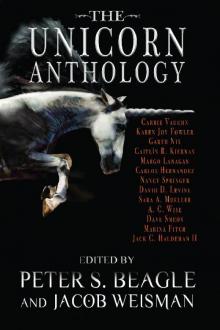 The Unicorn Anthology.indb
The Unicorn Anthology.indb Sleight of Hand
Sleight of Hand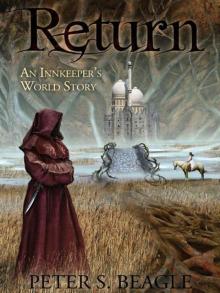 Return
Return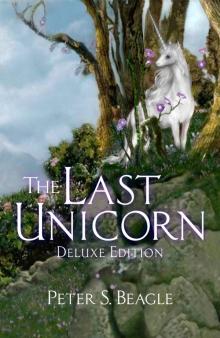 The Last Unicorn
The Last Unicorn Two Hearts
Two Hearts Mirror Kingdoms: The Best of Peter S. Beagle
Mirror Kingdoms: The Best of Peter S. Beagle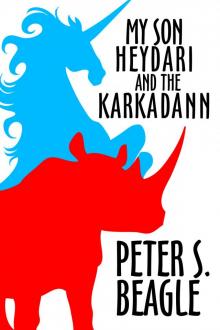 My Son Heydari and the Karkadann
My Son Heydari and the Karkadann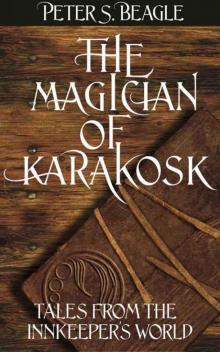 The Magician of Karakosk, and Other Stories
The Magician of Karakosk, and Other Stories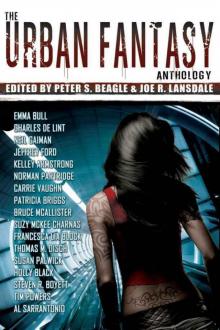 The Urban Fantasy Anthology
The Urban Fantasy Anthology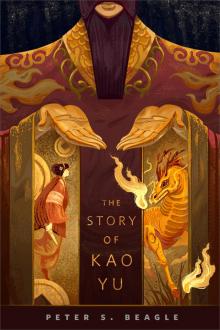 The Story of Kao Yu
The Story of Kao Yu The Karkadann Triangle
The Karkadann Triangle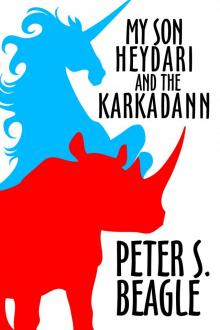 My Son and the Karkadann
My Son and the Karkadann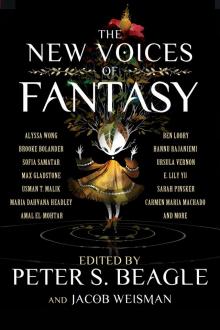 The New Voices of Fantasy
The New Voices of Fantasy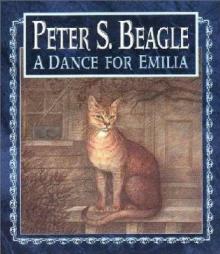 A Dance for Emilia
A Dance for Emilia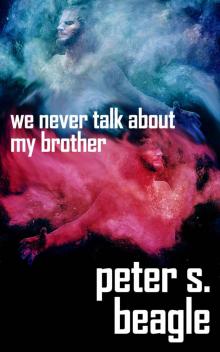 We Never Talk About My Brother
We Never Talk About My Brother The Folk Of The Air
The Folk Of The Air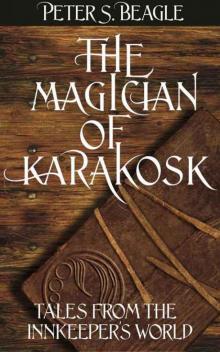 The Magician of Karakosk: Tales from the Innkeeper's World
The Magician of Karakosk: Tales from the Innkeeper's World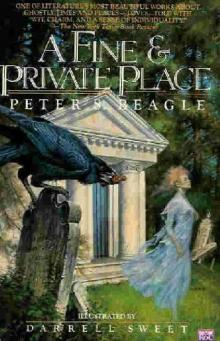 A Fine and Private Place
A Fine and Private Place Lila The Werewolf
Lila The Werewolf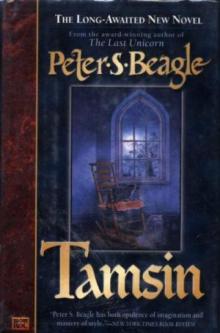 Tamsin
Tamsin Innkeeper's Song
Innkeeper's Song